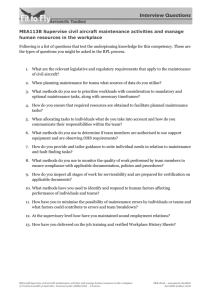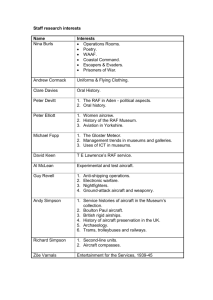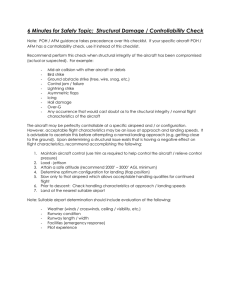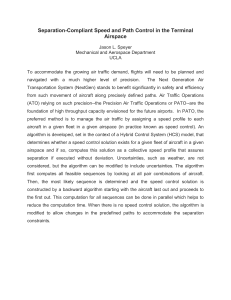Flight Tracking The Inmarsat view – and proposal 26 May 2014
advertisement
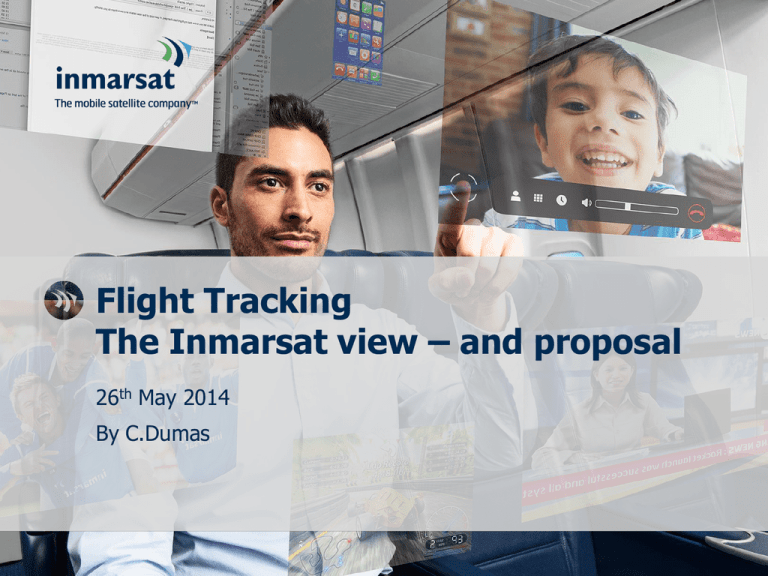
Flight Tracking The Inmarsat view – and proposal 26th May 2014 By C.Dumas Inmarsat - The mobile satellite company Founded 34 years ago by 88 countries under UN Charter to save and serve lives at sea A global communications capability A network built for mobility Global operator with network performance required at 99.9% - monitored by IMSO on behalf of IMO members An outstanding innovation record Deep security & safety heritage Unique Maritime and Aviation Safety and Distress services Mission-critical end-user needs Highly secure Fully-funded far into the future 2 System Capacity (logarithmic scale) Inmarsat is fully funded and invests I5 (x4) Global Xpress (Ka-Band) $1.6B USD Alphasat (x1) I4 (x3) Classic Aero Classic Aero SwiftBroadband SwiftBroadband I2 (x4) Classic Aero 1990-92 $1.5B USD $350M USD 2005-2008 2013 I3 (x5) Classic Aero Swift64 1996-98 2013-14 Inmarsat in Air Traffic Management The three Air Traffic Management pillars: CNS Communication • Voice over satcom • …to FANS1/A digital data-link: Already over oceans (Classic Aero, soon SBSafety) Navigation • Supporting satellite-based navigation aids Surveillance • From ground radars over land, HF over oceans… • FAA WAAS • EU EGNOS • …to ADS-C* over oceans Coming to continents (CPDLC over IRIS) *: Automatic Dependent Surveillance-Contract Flight Tracking issues Main issue in oceanic airspace, no ground surveillance means Commercial aviation: mostly wide body aircraft Need for an affordable solution: • to locate the aircraft in distress in a more systematic way, with more accuracy than with existing procedures / systems • To increase the reactivity in case of abnormal route deviation or event 5 Surveillance pillar – FANS / ADS-C ADS-C: an existing, robust service to track aircraft Concept developed by ICAO Regular position reports at pre-set frequencies (Periodic Contract). Automatically Triggered Deviation reports (Event). Increased rate of Periodic Contract in case of Event Alert in case of position report being not submitted within time limits. • Possibility of up to five contracts in parallel • • • • • Number of FANS capable Wide-Body aircraft flying oceanic routes is already nearing 80%. • New Wide-Body aircraft are all FANS 6 FANS / ADS-C coverage from ATSPs >Mostly all Graphic courtesy of The Boeing Company oceanic areas covered >Geographical coverage is expanding >Possible “contract” with airline’s own ground systems …but usage is not systematic – except over dense routes 7 ADS-C: a key element of ATM evolution Available now and cost-effective • Free of charge for basic Tracking One free ADS-C Position Reporting every 15’ offered by Inmarsat to the 80% of wide-body transoceanic aircraft that are FANS equipped. • Improved separation for dense oceanic routes: Increased reporting (every 5-10’) to reduce separation Minimal cost to airline (~$10 per flight), far below potential fuel savings. A key element of the evolution of ATM • Tested and proven for i4D • 4D trajectory in the future • Open room for more parameters and more triggering Events 8 …and Black Box in the Cloud “Available” now • Few solutions from different suppliers • Operating on Inmarsat Classic Aero would make them even more efficient (higher data rate – still “Black & White”) • But not standardised Tomorrow: • Need for Industry to define the requirement • No technology limitation expected thanks to SB Safety (“In Colour”) 9 How Inmarsat Enhances Aircraft Safety Challenge 1: Aircraft Equipage 11,000+ active aircraft virtually all WB aircraft Challenge 2: Cockpit Connection Global Aviation Safety Services Today • Increased Position Reporting via ADS-C – Basic reporting for free • Supports transmission of flight data recorder and cockpit voice recorder data Tomorrow • Investing in Safety Services over SwiftBroadband - the Future of Aircraft Safety Communications • Includes Position reporting base functionality built-in • Includes Prioritised IP link to stream FDR & CVR data if requested Thank you © Inmarsat
